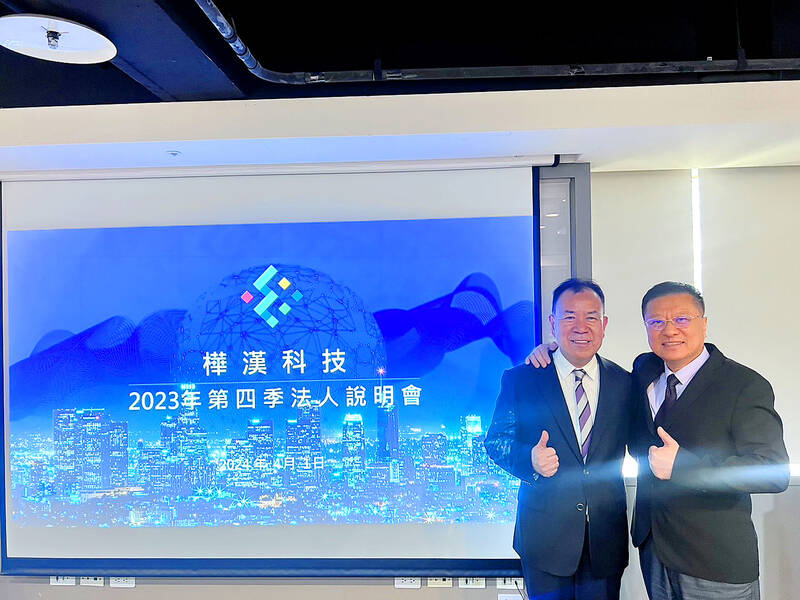Industrial computer maker Ennoconn Corp (樺漢科技) yesterday voiced confidence that revenue growth would remain robust this year based on the orders it has secured.
Revenue last year increased 12.4 percent to NT$121.64 billion (USS$3.8 billion), the subsidiary of Hon Hai Precision Industry Co (鴻海精密) said in a statement after an earnings conference.
Ennocon, which provides hardware solutions for point-of-sale, banking automation, kiosk, lottery and industrial automation systems, said that orders on hand had exceeded NT$140 billion, thanks to rapid developments in artificial intelligence (AI), semiconductors, robots and electric vehicles.

Photo courtesy of Ennoconn Corp
With clear order visibility for this year, the company aims to maintain a book-to-bill ratio of about 1.1 percent to 1.2 percent, it said. Figures above 1 percent indicate increasing demand.
In addition, Ennoconn plans to expand its Ennoconn solution as a service (ESaaS) business in light of the huge opportunities related to AI applications, semiconductors, robots and new energy installations, it said.
ESaaS products combine software and hardware, focusing mainly on digital transformation, AI, energy management, information security, and environmental, social and corporate governance (ESG) solutions.
ESaaS sales last year surged 74 percent year-on-year to NT$11.5 billion, accounting for 9.45 percent of the company’s total sales, Ennoconn said, projecting that ESaaS sales this year would increase by a double-digit percentage.
As Ennoconn in January acquired a 59.4 percent stake in Katek SE, a German company that offers smart industry solutions and provides remote control, safety and remote maintenance services in the energy field, the company expects the deal — if completed in the first half of the year — to help transform its ESaaS operations into a high-margin business and drive its overall earnings growth.
Ennoconn chairman Steve Chu (朱復銓) said that the company’s revenue and gross profit in the first quarter of this year were better than a year earlier and he is optimistic that full-year revenue, gross profit and net income would all showed marked growth from last year.
Propelled by the company’s three major units — design and manufacturing, systems integration and brand business — net profit last year jumped 73.2 percent year-on-year to NT$2.26 billion, while operating profit soared 68.8 percent to a record NT$5.21 billion, Ennoconn said.
Earnings per share were NT$19.01, it said.
Gross margin improved 1.3 percentage points to 19.4 percent and operating margin rose 1.5 percentage points to 4.3 percent last year, it said.
The company’s board of directors on Friday proposed distributing a cash dividend of NT$11.41 per share, implying a payout ratio of about 60 percent.

Hon Hai Precision Industry Co (鴻海精密) yesterday said that its research institute has launched its first advanced artificial intelligence (AI) large language model (LLM) using traditional Chinese, with technology assistance from Nvidia Corp. Hon Hai, also known as Foxconn Technology Group (富士康科技集團), said the LLM, FoxBrain, is expected to improve its data analysis capabilities for smart manufacturing, and electric vehicle and smart city development. An LLM is a type of AI trained on vast amounts of text data and uses deep learning techniques, particularly neural networks, to process and generate language. They are essential for building and improving AI-powered servers. Nvidia provided assistance

DOMESTIC SUPPLY: The probe comes as Donald Trump has called for the repeal of the US$52.7 billion CHIPS and Science Act, which the US Congress passed in 2022 The Office of the US Trade Representative is to hold a hearing tomorrow into older Chinese-made “legacy” semiconductors that could heap more US tariffs on chips from China that power everyday goods from cars to washing machines to telecoms equipment. The probe, which began during former US president Joe Biden’s tenure in December last year, aims to protect US and other semiconductor producers from China’s massive state-driven buildup of domestic chip supply. A 50 percent US tariff on Chinese semiconductors began on Jan. 1. Legacy chips use older manufacturing processes introduced more than a decade ago and are often far simpler than

STILL HOPEFUL: Delayed payment of NT$5.35 billion from an Indian server client sent its earnings plunging last year, but the firm expects a gradual pickup ahead Asustek Computer Inc (華碩), the world’s No. 5 PC vendor, yesterday reported an 87 percent slump in net profit for last year, dragged by a massive overdue payment from an Indian cloud service provider. The Indian customer has delayed payment totaling NT$5.35 billion (US$162.7 million), Asustek chief financial officer Nick Wu (吳長榮) told an online earnings conference. Asustek shipped servers to India between April and June last year. The customer told Asustek that it is launching multiple fundraising projects and expected to repay the debt in the short term, Wu said. The Indian customer accounted for less than 10 percent to Asustek’s

Gasoline and diesel prices this week are to decrease NT$0.5 and NT$1 per liter respectively as international crude prices continued to fall last week, CPC Corp, Taiwan (CPC, 台灣中油) and Formosa Petrochemical Corp (台塑石化) said yesterday. Effective today, gasoline prices at CPC and Formosa stations are to decrease to NT$29.2, NT$30.7 and NT$32.7 per liter for 92, 95 and 98-octane unleaded gasoline respectively, while premium diesel is to cost NT$27.9 per liter at CPC stations and NT$27.7 at Formosa pumps, the companies said in separate statements. Global crude oil prices dropped last week after the eight OPEC+ members said they would